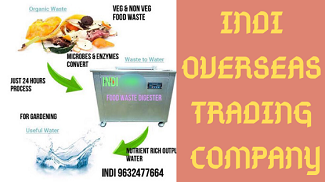29 December 2018, Bengaluru: INDI-EXBIO:
Solid waste is a major concern to municipal authorities across the nation and worse in the metros. As urbanisation increases, huge waste is generated and this needs to be disposed properly.
‘Indian stats at a glance:
1,342,512,706 people
7,935 towns, 497 cities, 6,49,481 villages
Approximately 90 million tons of municipal solid waste per year
Of which, waste collected is estimated as 43 million tons
11.9 MT is treated, and 31 MT is dumped
Government of INDIA is spending approx Rs. 998 crores annually on Waste Management…yet there is a wide gap….How alarming the equation is……….
The problem of waste management is massive with majority being dumped in vacant land out of the city limits.’ Especially organic waste if disposed improperly will lead to various diseases for the people dwelling around the area.
A report states, “About 90% of Municipal Solid Waste (MSW) is disposed of unscientifically in open dumps and landfills, creating problems to public health and the environment.”
The same report adds, “With increasing urbanization and changing life styles, Indian cities now generate eight times more MSW than they did in 1947. Presently, about 90 million t of solid waste are generated annually as by-products of industrial, mining, municipal, agricultural and other processes.”
However no longer will this be a problem for the state governments, with the vision of Subba Rao, Founder of INDI OVERSEAS TRADING COMPANY, from Bengaluru who plans to market INDI-EXBIO machines, where food waste is digested using microbes and enzymes by TCA cycle. The introduction of these waste food gobblers will help environment through reduction in carbon foot print through scientific method to process wet waste of municipal wet waste.
At an average almost 90% of wet waste issues would be reduced with these machines in place. In a candid chat he explained, “By using scientific method to process wet waste through food waste digesters (new technology) machine, at each ward in a city / kitchens of hotels / apartments. This machine digests all the wet waste in 24 hours and converts it into grey water.’
The pilot project is to be launched in Bengaluru and then the services would be extended to other metros like Mumbai, Pune, Chennai and Delhi. ‘One ton organic / food waste produces 1.9 tons of carbon dioxide in a land fill / Biogas plant , In our machine 35% less production of Co2 means only 1.2 tons is produced,’ informed Subba Rao.
He added, ‘This is a universal problem. In the last 5 years South Korea has developed a new technology to dispose organic wet waste. This technology is almost same as the digestive method of human stomach. These machines are manufactured in South Korea by a company called EXBIO.’
How does it work:
The digestion of food waste (organic waste) takes place by breaking down the carbo hydrates in to carbs and hydrogen (like in KREB cycle) using specially designed mixture of microbes and enzymes , which stabilises by reacting with atmospheric oxygen and oxygen present in the water supplied to the machine, as carbon dioxide and water.
The fat, oil & grease get converted as heat. The carbon dioxide produced is carbon neutral. The enzymes and microbes mixture added to the machine lasts for More than a year in the machine.
The machine is completely made of stainless steel and lasts for more than 15 years. The machine of computer controlled and gives data about the addition of food waste every day, week & month. We are also coming out with carbon dioxide data emission from the machine periodically’.
Presently, the waste is disposed by landfill methods, Aerobic composting process or by BIO – GAS anaerobic process. However depending on the Carbon-di-oxide emission and the quantity of digestive levels, the INDI-EXBIO is the most efficient.
What is the process:
Food waste is put into the inlet door
- The waste is processed with the Microorganism in the machine, mixed and fermented in the Chamber. The food waste is decomposed by special blend of microorganisms aided by enzymes
- After 24 hours, all kinds of organic materials are decomposed as gas and water
- Machine never needs emptying, you can add food waste at any time, not a batch process
And the Cost of conversion of 1 kg food waste to water is approx. Rs 1.50 – Rs 1.75 by using INDI-EXBIO machines.
He concluded, ‘In our INDI-EXBIO food waste digester machine, only 4 Molecules of carbon dioxide are produced. Other carbon atoms are converted to energy by electron transport. 95% food waste is converted to carbon dioxide and water. There is approximately 35% less carbon dioxide is produced in our machine (TCA cycle) compared to Bio – Gas or composting.’
#Way2World brings #StartUpNews from #StartUpResources about #StartUpFounders, #Co-Founders, #WomenEntrepreneurs, #WomenLeaders, #StartUpMentors, #StartUpInnovation #StartUpIncubators, #StartUpAccelerators and #StartUpListing. The #StartUpArticles, #StartUpReviews and #StartUpStories discuss about #StartUpFunding, #IndianStart-Ups their #BusinessServices along with #StartUpName and #technologyimpactness. With Inputs from internet – RajKishan

